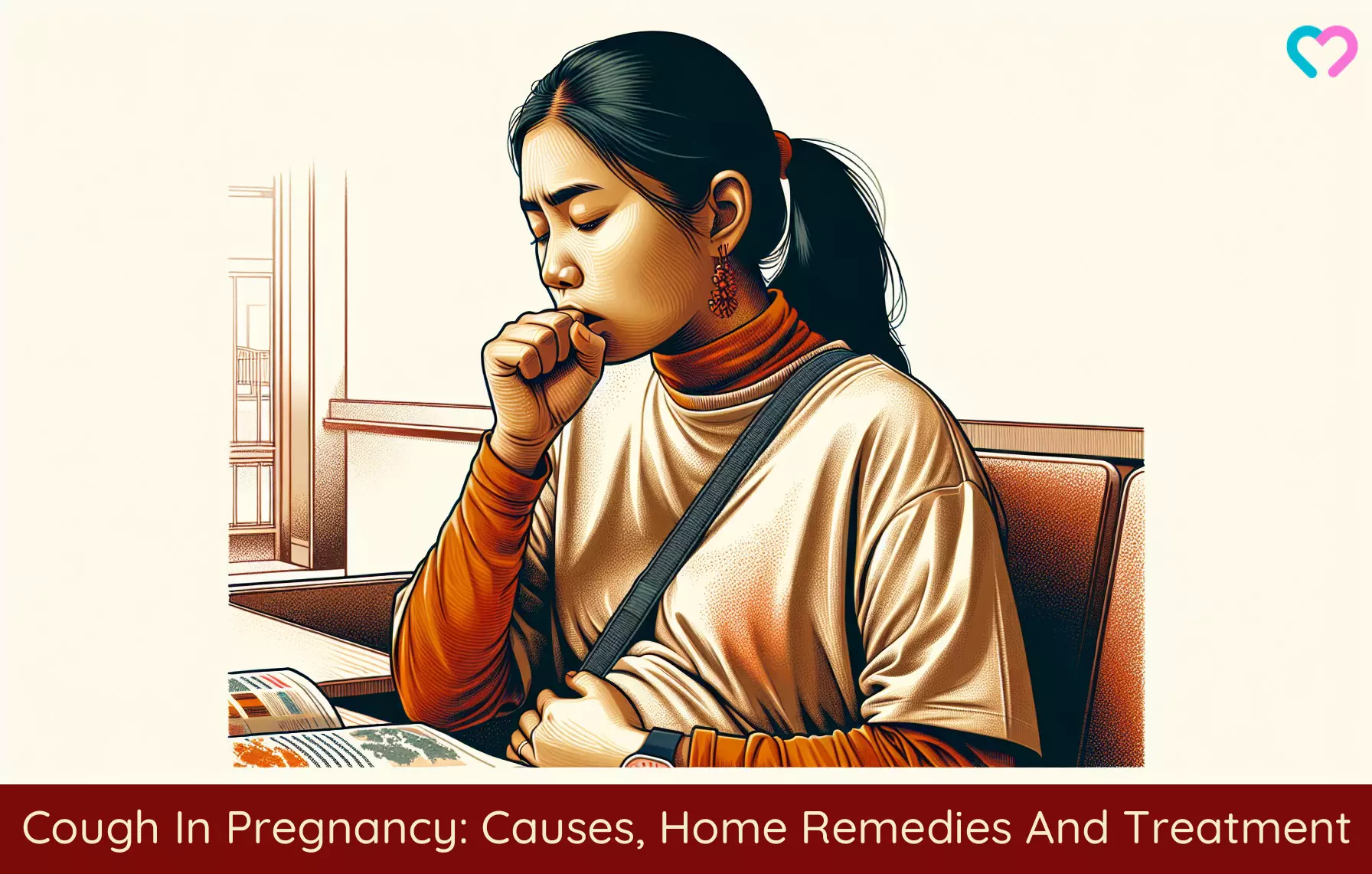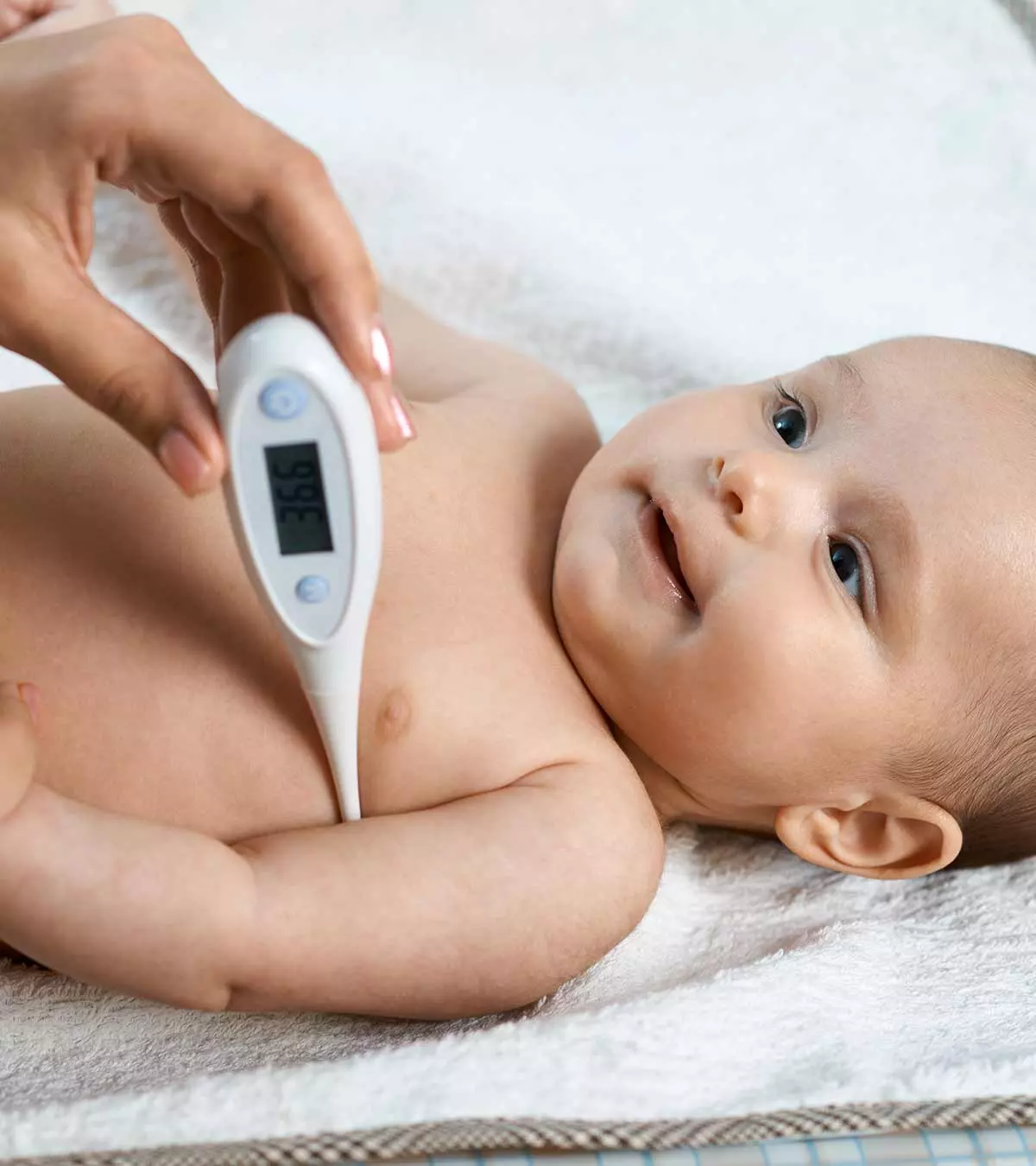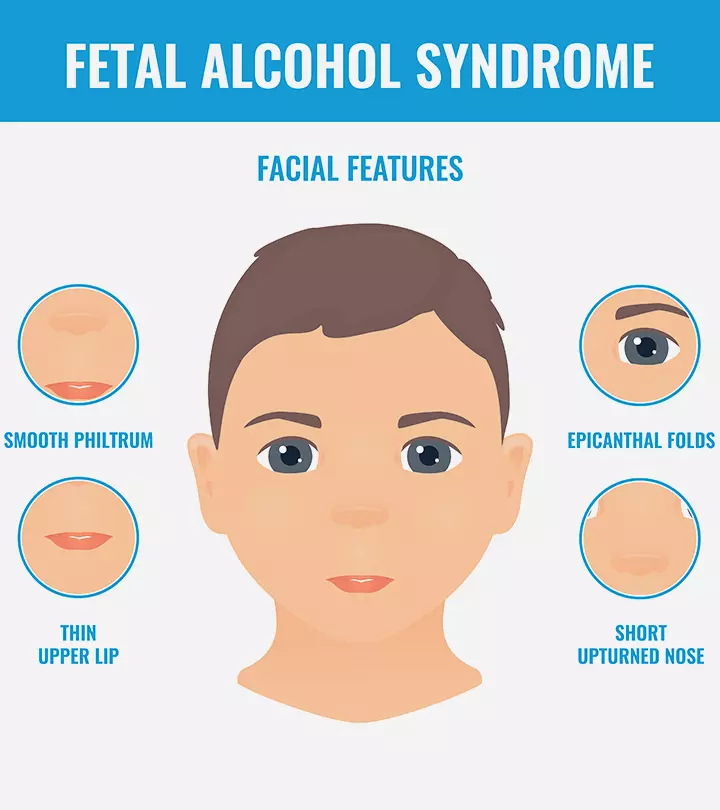
Image: Shutterstock
Cough in pregnancy can be more intense and long-lasting than usual. Cough, in general, is a self-limiting condition. However, it can be more uncomfortable during pregnancy, when the body undergoes various physical, emotional, and hormonal changes and changes to the immune system.
The American Pregnancy Association states that pregnancy-associated immune system changes can increase a pregnant woman’s susceptibility to various infections and allergens and lead to cough during pregnancy (1) (2). Moreover, one may develop a cough if they contract influenza (flu) or the common cold during pregnancy.
Understanding coughs during pregnancy is vital for both mother and baby. While most are harmless, some may signal serious conditions needing attention. In this post, you can read about the causes of cough, its impact on the fetus, and management and preventive strategies.
Key Pointers
- Pregnancy rhinitis, common cold, influenza, and covid infection can cause cough in pregnancy.
- Cough can be reduced in pregnancy using saline nasal drops, humidifiers, decent sleep, honey, warm water, and adequate hydration.
- Practicing frequent hand washing, avoiding contact with infected persons, and getting required vaccinations could help prevent coughs in pregnancy.
What Causes Cough During Pregnancy?
Cough can be a presenting symptom of the following conditions during pregnancy:
- Common cold or mild upper respiratory illness: Caused by numerous viruses and contracted due to immunogeniciThe ability of a substance to elicit immunological responses. changes in pregnancy (3)
- Influenza or flu: It can be severe in pregnancy and harmful for the developing baby.
- Whooping cough (or pertussis): It is a serious condition that may cause ill effects on an unborn baby. The CDC recommends each pregnant woman to go for the Tdap vaccine during the third trimester to protect the baby(4).
- Pregnancy rhinitis (or hormonal rhinitis): A symptom or side effect of pregnancy that includes a stuffy (nasal congestion) and runny nose, sneezing, and a post-nasal drip, which can cause coughing (5)
- SARS-CoV-2 infection: Responsible for the Covid-19 pandemic (6)
Other conditions that can cause cough in pregnancy are (7)
- BronchitisiAn infection in the airways that causes them to become inflamed and irritated.
- Asthma or bronchial asthma
- Gastroesophageal reflux (GERD) or heartburn
- Allergic rhinitis
How Is Cough Treated In Pregnancy?
Since several factors are responsible for cough in pregnancy, the treatment depends on the type of cough and underlying cause. The following are some methods to treat cough in pregnancy (1):
- Coughs due to nasal congestion can be relieved with nasal strips, saline nasal drops, keeping your head elevated while sleeping, or using a humidifieriAn appliance that releases steam to enhance the moisture content of the air. .

- Adequate rest, sleep, water intake, and a healthy diet could improve immunity, helping your body recover from illnesses and mild cough.
- Certain over-the-counter (OTC) drugs and cough drops during pregnancy may help treat cough and cold symptoms. However, avoid self-medication and consult your health care provider before taking any medications.
The following are some medications that are safe for treating cough in pregnancy (1):
- Acetaminophen (paracetamol) can relieve fever, cough, and cold.
- Cough suppressants, including dextromethorphan at a maximum dose of 120mg per day helps treat dry cough in pregnancy (8) (9).
- Anesthetic sore throat lozenges can ease throat pain or irritation, which causes cough.
- Decongestants may be harmful to the baby if overused. Consult your doctor before using them (3) (10)
- OTC antihistamineiA class of medications used to treat allergies by blocking the action of histamines (allergens). drugs such as cetirizine are relatively safe and help relieve flu symptoms. They may, however, cause sleepiness.
 Quick fact
Quick factWhat Are The Natural Remedies For Cough In Pregnancy?
Since cough medicines are often contraindicated in pregnancy, you might be suggested natural or home remedies for cough during pregnancy, including (1)
- Drinking warm water and inhaling steam
- Gargling with salty warm water
- Honey (9)
- Green tea, lemon tea, or herbal tea

Herbs such as sage, chamomile, thyme, aniseed, fenugreek, peppermint, eucalyptus, cumin, garlic, and ginger are useful in treating cough in pregnancy. However, consult your gynecologist before taking these herbs (11) (12).
 Quick tip
Quick tipHow Can Cough In Pregnancy Be Prevented?
To avoid falling sick or contracting a cold or cough during pregnancy, maintaining a healthy lifestyle is of prime importance.
Your daily routine should include (1):
- Rest: Adequate rest and sleep are critical and give the body enough time to replenish.
- Drink plenty of fluids: Drink lots of water, juice, or healthy soups to help restore the necessary fluids in the body.
- Diet: Eat balanced, healthy, and nutritious food.
- Routine exercise: Do exercises regularly, including aerobic and strength-conditioning exercises. However, contact your health care provider or physiotherapist before exercising (13)
- Have covid-appropriate behavior by wearing a mask and maintaining social distancing.
Other methods to prevent contracting a cough when pregnant are (1)
- Regular hand washing

- Avoiding allergen exposure (10)
- Avoiding touching your eyes, nose, and mouth with unwashed hands to reduce exposure to bacteria (14)
- Avoiding physical contact with sick people and sharing cutlery or towels with them
- Avoiding smoking and second-hand smoke, which cause respiratory irritation (15).
- Taking your prenatal vitamins and probiotics on time
- Getting your flu shots, covid vaccinations and Tdap vaccine (2) (4)
Does Coughing During Pregnancy Harm The Baby?
Although contracting an ordinary cough during pregnancy may cause fatigue, it is usually not harmful to the baby.
Research suggests that colds and flu with high-grade fever right before or in the early weeks of pregnancy may raise risk of congenitali A structural or functional abnormality present from birth. impairments, including (16):
- Cleft lip with or without cleft palate
- AnencephalyiA rare but serious abnormality in which a baby is born without the major parts of the central nervous system.
- Limb reduction
- Spina bifida
- Encephalocele
- Colonic atresiaiA congenital abnormality in which the colon (a large part of the large intestine) does not develop properly. /stenosis
- Bilateral renal agenesis/hypoplasiaiA condition characterized by incomplete or improper development of a specific organ.
- Gastroschisis
When Should You See A Doctor?
Typically, a cough is not a harmful condition during pregnancy. However, persistent or excessive coughing during pregnancy needs prompt medical attention. Hence, you should contact your doctor in the following scenarios (1) (10):
- If you experience excessive coughing during pregnancy or your cough does not improve and persists for more than seven days

- If you have difficulty sleeping and eating
- If your cough produces greenish/yellow sputum
- If you develop chest pain, breathing difficulty, or wheezing along with the cough
- If you have a fever (over 100.2°F) with the cough
Frequently Asked Questions
1. Why does coughing make me leak in my pants?
During pregnancy, you may use the bathroom more frequently and have urine leakage (urinary incontinence) because of the pressure added by the uterus on your bladder. This causes the bladder to compress, leaving less space for urine and leading to stress urinary incontinence (SUI). Hence, extra pressure or stress is added when you cough or laugh, causing urine leakage or SUI (15).
2. Can I take a test for COVID for cough during pregnancy?
If you suspect contracting a COVID infection when pregnant, you should speak to your healthcare provider or obstetrician about getting tested for the infection. In addition, you must discuss the safe and potential treatment options with your doctor and not resort to self-medication while pregnant (17).
3. Can a severe cough cause miscarriage?
Cough and cold do not cause miscarriage (1). However, in some cases, the cough and cold could be a symptom of a severe underlying illness, such as severe acute respiratory syndrome (SARS), which may increase the risk of complications such as miscarriage, fetal growth restriction, and preterm birth (18).
4. How can I stop coughing at night while pregnant?
If you wake up coughing at night, you may try drinking warm fluids and keeping your head elevated when sleeping. In addition, you may consult a doctor about the safe and suggested dose of a cough suppressant or expectorant to get rid of dry cough in pregnancy (8).
Women are susceptible to cough in pregnancy as they may have a weaker immune response during this time. Thus, you should be extra careful about your health and well-being while pregnant to avoid the risks of any complications. Further, you should not take any over-the-counter medications to treat cough without first running it by your doctor. You could also resort to home remedies for cough during pregnancy. Using a humidifier, gargling with warm salt water, and consuming honey to help alleviate the symptoms of this condition.
Infographic: What You Need To Know About Whooping Cough In Pregnancy
Whooping cough causes persistent coughing and breathing difficulties in pregnant women. Identifying the signs and seeking prompt medical care is paramount to protecting the expectant mother and her baby. Explore this infographic to comprehend some critical points about the symptoms and prevention of whooping cough in pregnancy. Illustration: Momjunction Design Team
Illustration: Cough In Pregnancy: Causes Home Remedies And Treatment

Image: Dall·E/MomJunction Design Team
A number of different reasons may cause cough during pregnancy. Here is a video with a few simple remedies to deal with this condition.
References
- Cough and Cold During Pregnancy.
https://americanpregnancy.org/healthy-pregnancy/pregnancy-complications/cough-cold-during-pregnancy/ - Flu & Pregnancy.
https://www.cdc.gov/flu/highrisk/pregnant.htm - Aida Erebara et al.; (2008); Treating the common cold during pregnancy.
https://www.ncbi.nlm.nih.gov/pmc/articles/PMC2377219/ - Tdap Vaccination for Pregnant Women.
https://www.cdc.gov/pertussis/vaccines/tdap-vaccination-during-pregnancy.html - Allergic rhinitis: Your nose knows.
https://www.health.harvard.edu/diseases-and-conditions/allergic-rhinitis-your-nose-knows - Dominik Wolff et al.; (2021); Risk factors for Covid-19 severity and fatality: a structured literature review.
https://www.ncbi.nlm.nih.gov/pmc/articles/PMC7453858/ - M A Ryabova et al.; (2016); Differential diagnostics of the causes responsible for a cough in the pregnant women.
https://pubmed.ncbi.nlm.nih.gov/27500580/ - Medicines in pregnancy.
https://thewomens.r.worldssl.net/images/uploads/fact-sheets/Medicines_and_pregnancy_240816.pdf - Which over-the-counter cold medications are safe during pregnancy?
https://utswmed.org/medblog/otc-cold-medication-safe-pregnancy/ - Coughs and Colds in Pregnancy.
https://www.nygh.on.ca/areas-care/maternal-newborn-and-paediatric-care/pregnancy-and-birth/guide-pregnancy-and-birth/during-pregnancy/coughs-and-colds-pregnancy - Lisha J. John and Nisha Shantakumari; (2015); Herbal Medicines Use During Pregnancy: A Review from the Middle East.
https://www.ncbi.nlm.nih.gov/pmc/articles/PMC4561638/ - Common cold.
https://www.mountsinai.org/health-library/condition/common-cold - Pregnancy and exercise.
https://www.betterhealth.vic.gov.au/health/healthyliving/pregnancy-and-exercise - Colds and pregnancy.
https://www.marchofdimes.org/find-support/blog - Tips to prevent involuntary urine leakage (incontinence) during and after pregnancy.
https://utswmed.org/medblog/leakage-incontinence-during-after-pregnancy/ - Dorothy Kim Waller et al.; (2018); Maternal report of fever from cold or flu during early pregnancy and the risk for noncardiac birth defects, National Birth Defects Prevention Study, 1997–2011.
https://www.ncbi.nlm.nih.gov/pmc/articles/PMC5831519/ - Special Considerations in Pregnancy
https://www.covid19treatmentguidelines.nih.gov/special-populations/pregnancy/ - Shell F Wong et al. (2004); Pregnancy and perinatal outcomes of women with severe acute respiratory syndrome.
https://www.ncbi.nlm.nih.gov/pmc/articles/PMC7137614/ - Medicine and pregnancy: what you need to know.
https://thewomens.r.worldssl.net/images/uploads/fact-sheets/Medicines_and_pregnancy_240816.pdf - Treatments for post-nasal drip.
https://www.health.harvard.edu/staying-healthy/treatments-for-post-nasal-drip - Caterina Vicidomini et al.; (2021); Molecular Basis of the Therapeutical Potential of Clove (Syzygium aromaticum L.) and Clues to Its Anti-COVID-19 Utility.
https://www.ncbi.nlm.nih.gov/pmc/articles/PMC8036487/
Community Experiences
Join the conversation and become a part of our nurturing community! Share your stories, experiences, and insights to connect with fellow parents.
Read full bio of Dr. Priyanka Arora
Read full bio of Reshmi Das
Read full bio of Rebecca Malachi
Read full bio of Aneesha Amonz

















